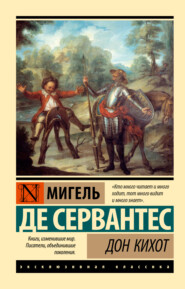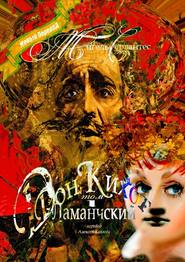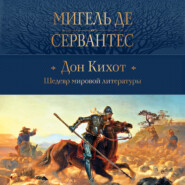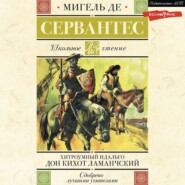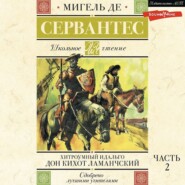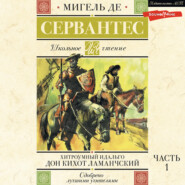По всем вопросам обращайтесь на: info@litportal.ru
(©) 2003-2025.
✖
The Exemplary Novels of Cervantes
Настройки чтения
Размер шрифта
Высота строк
Поля
"What is that you are saying?" cried Lorenzo, who had caught a part of these words. "Where is the Lady Cornelia?" "She is above," replied the page; and the duke, who supposed that his consort had just made her appearance, had scarcely heard the words before he rushed from the apartment like a flash of lightning, and, ascending the staircase at a bound, gained the chamber into which Don Antonio was entering.
"Where is Cornelia? where is the life of my life?" he exclaimed, as he hurried into the room.
"Cornelia is here," replied a woman who was wrapped in a quilt taken from the bed with which she had concealed her face. "Lord bless us!" she continued, "one would think an ox had been stolen! Is it a new thing for a woman to visit a page, that you make such a fuss about it?"
Lorenzo, who had now entered the room, angrily snatched off the sheet and exposed to view a woman still young and not ill-looking, who hid her face in her hands for shame, while her dress, which served her instead of a pillow, sufficiently proved her to be some poor castaway.
The duke asked her, was it true her name was Cornelia? It was, she replied – adding, that she had very decent parents in the city, but that no one could venture to say, "Of this water I will never drink."
The duke was so confounded by all he beheld, that he was almost inclined to think the Spaniards were making a fool of him; but, not to encourage so grievous a suspicion, he turned away without saying a word. Lorenzo followed him; they mounted their horses and rode off, leaving Don Juan and Don Antonio even more astonished and dismayed than himself.
The two friends now determined to leave no means untried, possible or impossible, to discover the retreat of the Lady Cornelia, and convince the duke of their sincerity and uprightness. They dismissed Santisteban for his misconduct, and turned the worthless Cornelia out of the house. Don Juan then remembered that they had neglected to describe to the duke those rich jewels wherein Cornelia carried her relics, with the agnus she had offered to them; and they went out proposing to mention that circumstance, so as to prove to Alfonso that the lady had, indeed, been in their care, and that if she had now disappeared, it was not by any fault of theirs.
They expected to find the duke in Lorenzo's house; but the latter informed them that Alfonso had been compelled to leave Bologna, and had returned to Ferrara, having committed the search for Cornelia to his care. The friends having told him what had brought them, Lorenzo assured them that the duke was perfectly convinced of their rectitude in the matter, adding, that they both attributed the flight of Cornelia to her great fear, but hoped, and did not doubt, that Heaven would permit her re-appearance before long, since it was certain that the earth had not swallowed the housekeeper, the child, and herself.
With these considerations they all consoled themselves, determining not to make search by any public announcement, but secretly, since, with the exception of her cousin, no person was yet acquainted with the disappearance of Cornelia; and Lorenzo judged that a public search might prove injurious to his sister's name among such as did not know the whole circumstances of the case, since the labour of effacing such suspicions as might arise would be infinite, and by no means certain of success.
The duke meanwhile continued his journey to Ferrara, and favouring Fortune, which was now preparing his happiness, led him to the village where dwelt that priest in whose house Cornelia, her infant, and the housekeeper, were concealed. The good Father was acquainted with the whole history, and Cornelia had begged his advice as to what it would be best for her to do. Now this priest had been the preceptor of the duke; and to his dwelling, which was furnished in a manner befitting that of a rich and learned clerk, the duke was in the habit of occasionally repairing from Ferrara, and would thence go to the chase, or amuse himself with the pleasant conversation of his host, and with the knowledge and excellence of which the good priest gave evidence in all he did or said.
The priest was not surprised to receive a visit from the duke, because, as we have said, it was not the first by many; but he was grieved to see him sad and dejected, and instantly perceived that his whole soul was absorbed in some painful thought. As to Cornelia, having been told that the duke was there, she was seized with renewed terror, not knowing how her misfortunes were to terminate. She wrung her hands, and hurried from one side of her apartment to the other, like a person who had lost her senses. Fain would the troubled lady have spoken to the priest, but he was in conversation with the Duke, and could not be approached. Alfonso was meanwhile saying to him, "I come to you, my father, full of sadness, and will not go to Ferrara to-day, but remain your guest; give orders for all my attendants to proceed to the city, and let none remain with me but Fabio."
The priest went to give directions accordingly, as also to see that his own servants made due preparations; and Cornelia then found an opportunity for speaking to him. She took his two hands and said, "Ah, my father, and dear sir, what has the duke come for? for the love of God see what can be done to save me! I pray you, seek to discover what he proposes. As a friend, do for me whatever shall seem best to your prudence and great wisdom."
The priest replied, "Duke Alfonso has come to me in deep sadness, but up to this moment he has not told me the cause. What I would have you now do is to dress this infant with great care, put on it all the jewels you have with you, more especially such as you may have received from the duke himself; leave the rest to me, and I have hope that Heaven is about to grant us a happy day." Cornelia embraced the good man, and kissed his hand, and then retired to dress and adorn the babe, as he had desired.
The priest, meanwhile, returned to entertain the duke with conversation while his people were preparing their meal; and in the course of their colloquy he inquired if he might venture to ask him the cause of his grief, since it was easy to see at the distance of a league that, something gave him sorrow.
"Father," replied the duke, "it is true that the sadness of the heart rises to the face, and in the eyes may be read the history of that which passes in the soul; but for the present I cannot confide the cause of my sorrow to any one."
"Then we will not speak of it further, my lord duke," replied the priest; "but if you were in a condition permitting you to examine a curious and beautiful thing, I have one to show you which I cannot but think would afford you great pleasure."
"He would be very unwise," returned Alfonso, "who, when offered a solace for his suffering, refuses to accept it. Wherefore show me what you speak of, father; the object is doubtless an addition to one of your curious collections, and they have all great interest in my eyes."
The priest then rose, and repaired to the apartment where Cornelia was awaiting him with her son, whom she had adorned as he had suggested, having placed on him the relics and agnus, with other rich jewels, all gifts of the duke to the babe's mother. Taking the infant from her hands, the good priest then went to the duke, and telling him that he must rise and come to the light of the window, he transferred the babe from his own arms into those of Alfonso, who could not but instantly remark the jewels; and perceiving that they were those which he had himself given to Cornelia, he remained in great surprise. Looking earnestly at the infant, meanwhile, he fancied he beheld his own portrait; and full of admiration, he asked the priest to whom the child belonged, remarking, that from its decorations and appearance one might take it to be the son of some princess.
"I do not know," replied the priest, "to whom it belongs; all I can tell you is, that it was brought to me some nights since by a cavalier of Bologna, who charged me to take good care of the babe and bring it up heedfully, since it was the son of a noble and valiant father, and of a mother highly born as well as beautiful. With the cavalier there came also a woman to suckle the infant, and of her I have inquired if she knew anything of the parents, but she tells me that she knows nothing whatever; yet of a truth, if the mother possess but half the beauty of the nurse, she must be the most lovely woman in Italy."
"Could I not see her?" asked the Duke. "Yes, certainly you may see her," returned the priest. "You have only to come with me; and if the beauty and decorations of the child surprise you, I think the sight of the nurse cannot fail to produce an equal effect."
The priest would then have taken the infant from the duke, but Alfonso would not let it go; he pressed it in his arms, and gave it repeated kisses; the good father, meanwhile, hastened forward, and bade Cornelia approach to receive the duke. The lady obeyed; her emotion giving so rich a colour to her face that the beauty she displayed seemed something more than human. The duke, on seeing her, remained as if struck by a thunderbolt, while she, throwing herself at his feet, sought to kiss them. The duke said not a word, but gave the infant to the priest, and hurried out of the apartment.
Shocked at this, Cornelia said to the priest, "Alas, dear father, have I terrified the duke with the sight of my face? am I become hateful to him? Has he forgot the ties by which he has bound himself to me? Will he not speak one word to me? Was his child such a burden to him that he has thus rejected him from his arm's?"
To all these questions the good priest could give no reply, for he too was utterly confounded by the duke's hasty departure, which seemed more like a flight than anything else.
Meanwhile Alfonso had but gone out to summon Fabio. "Ride Fabio, my friend," he cried, "ride for your life to Bologna, and tell Lorenzo Bentivoglio that he must come with all speed to this place; let him make no excuse, and bid him bring with him the two Spanish gentlemen, Don Juan de Gamboa and Don Antonio de Isunza. Return instantly, Fabio, but not without them, for it concerns my life to see them here."
Fabio required no further pressing, but instantly carried his master's commands into effect. The duke returned at once to Cornelia, caught her in his arms, mingled his tears with hers, and kissed her a thousand times; and long did the fond pair remain thus silently locked in each other's embrace, both speechless from excess of joy. The nurse of the infant and the dame, who proclaimed herself a Crivella, beheld all this from the door of the adjoining apartment, and fell into such ecstasies of delight that they knocked their heads against the wall, and seemed all at once to have gone out of their wits. The priest bestowed a thousand kisses on the infant, whom he held on one arm, while with his right hand he showered no end of benedictions on the noble pair. At length his reverence's housekeeper, who had been occupied with her culinary preparations, and knew nothing of what had occurred, entered to notify to her master that dinner was on the table, and so put an end to this scene of rapture.
The duke then took his babe from the arms of the priest, and kept it in his own during the repast, which was more remarkable for neatness and good taste than for splendour. While they were at table, Cornelia related to the duke all that had occurred until she had taken refuge with the priest, by the advice of the housekeeper of those two Spanish gentlemen, who had protected and guarded her with such assiduous and respectful kindness. In return the duke related to her all that had befallen himself during the same interval; and the two housekeepers, who were present, received from him the most encouraging promises. All was joy and satisfaction, and nothing more was required for the general happiness, save the arrival of Lorenzo, Don Antonio, and Don Juan.
They came on the third day, all intensely anxious to know if the duke had received intelligence of Cornelia, seeing that Fabio, who did not know what had happened, could tell them nothing on that subject.
The duke received them alone in the antechamber, but gave no sign of gladness in his face, to their great grief and disappointment. Bidding them be seated, Alfonso himself sat down, and thus addressed Lorenzo: —
"You well know, Signor Lorenzo Bentivoglio, that I never deceived your sister, as my conscience and Heaven itself can bear witness; you know also the diligence with which I have sought her, and the wish I have felt to have my marriage with her celebrated publicly. But she is not to be found, and my word cannot be considered eternally engaged to a shadow. I am a young man, and am not so blasé as to leave ungathered such pleasures as I find on my path. Before I had ever seen Cornelia I had given my promise to a peasant girl of this village, but whom I was tempted to abandon by the superior charms of Cornelia, giving therein a great proof of my love for the latter, in defiance of the voice of my conscience. Now, therefore, since no one can marry a woman who does not appear, and it is not reasonable that a man should eternally run after a wife who deserts him, lest he should take to his arms one who abhors him, I would have you consider, Signor Lorenzo, whether I can give you any further satisfaction for an affront which was never intended to be one; and further, I would have you give me your permission to accomplish my first promise, and solemnise my marriage with the peasant girl, who is now in this house."
While the duke spoke this, Lorenzo's frequent change of colour, and the difficulty with which he forced himself to retain his seat, gave manifest proof that anger was taking possession of all his senses. The same feelings agitated Don Antonio and Don Juan, who were resolved not to permit the duke to fulfil his intention, even should they be compelled to prevent it by depriving him of life. Alfonso, reading these resolves in their faces, resumed: "Endeavour to calm yourself, Signor Lorenzo; and before you answer me one word, I will have you see the beauty of her whom I desire to take to wife, for it is such that you cannot refuse your consent, and it might suffice, as you will acknowledge, to excuse a graver error than mine."
So saying, the duke rose, and repaired to the apartment where Cornelia was awaiting him in all the splendour of her beauty and rich decorations. No sooner was he gone than Don Juan also rose, and laying both hands on the arms of Lorenzo's chair, he said to him, "By St. James of Galicia, by the true faith of a Christian, and by my honour as a gentleman, Signor Lorenzo, I will as readily allow the duke to fulfil his project as I will become a worshipper of Mahomed. Here, in this spot, he shall yield up his life at my hands, or he shall redeem the promise given to your sister, the lady Cornelia. At the least, he shall give us time to seek her; and until we know to a certainty that she is dead, he shall not marry."
"That is exactly my own view," replied Lorenzo. "And I am sure," rejoined Don Juan, "that it will be the determination of my comrade, Don Antonio, likewise."
While they were thus speaking, Cornelia appeared at the door between the duke and the priest, each of whom led her by one hand. Behind them came Sulpicia, her waiting woman, whom the duke had summoned from Ferrara to attend her lady, with the infant's nurse, and the Spaniards' housekeeper. When Lorenzo saw his sister, and had assured himself it was indeed Cornelia, – for at first the apparently impossible character of the occurrence had forbidden his belief, – he staggered on his feet, and cast himself at those of the duke, who, raising him, placed him in the arms of his delighted sister, whilst Don Juan and Don Antonio hastily applauded the duke for the clever trick he had played upon them all.
Alfonso then took the infant from Sulpicia, and, presenting it to Lorenzo, he said, "Signor and brother, receive your nephew, my son, and see whether it please you to give permission for the public solemnisation of my marriage with this peasant girl – the only one to whom I have ever been betrothed."
To repeat the replies of Lorenzo would be never to make an end, and the rather if to these we added the questions of Don Juan, the remarks of Don Antonio, the expressions of delight uttered by the priest, the rejoicing of Sulpicia, the satisfaction of the housekeeper who had made herself the counsellor of Cornelia, the exclamations of the nurse, and the astonishment of Fabio, with the general happiness of all.
The marriage ceremony was performed by the good priest, and Don Juan de Gamboa gave away the bride; but it was agreed among the parties that this marriage also should be kept secret, until he knew the result of the malady under which the duchess-dowager was labouring; for the present, therefore, it was determined that Cornelia should return to Bologna with her brother. All was done as thus agreed on; and when the duchess-dowager died, Cornelia made her entrance into Ferrara, rejoicing the eyes of all who beheld her: the mourning weeds were exchanged for festive robes, the two housekeepers were enriched, and Sulpicia was married to Fabio. For Don Antonio and Don Juan, they were sufficiently rewarded by the services they had rendered to the duke, who offered them two of his cousins in marriage, with rich dowries. But they replied, that the gentlemen of the Biscayan nation married for the most part in their own country; wherefore, not because they despised so honourable a proffer, which was not possible, but that they might not depart from a custom so laudable, they were compelled to decline that illustrious alliance, and the rather as they were still subject to the will of their parents, who had, most probably, already affianced them.
The duke admitted the validity of their excuses, but, availing himself of occasions warranted by custom and courtesy, he found means to load the two friends with rich gifts, which he sent from time to time to their house in Bologna. Many of these were of such value, that although they might have been refused for fear of seeming to receive a payment, yet the appropriate manner in which they were presented, and the particular periods at which Alfonso took care that they should arrive, caused their acceptance to be easy, not to say inevitable; such, for example, were those despatched by him at the moment of their departure for their own country, and those which he gave them when they came to Ferrara to take their leave of him.
At this period, the Spanish gentlemen found Cornelia the mother of two little girls, and the duke more enamoured of his wife than ever. The duchess gave the diamond cross to Don Juan, and the gold agnus to Don Antonio, both of whom had now no choice but to accept them. They finally arrived without accident in their native Spain, where they married rich, noble, and beautiful ladies; and they never ceased to maintain a friendly correspondence with the duke and duchess of Ferrara, and with Lorenzo Bentivoglio, to the great satisfaction of all parties.
END OF THE LADY CORNELIA
RINCONETE AND CORTADILLO:Or, Peter of the Corner and the Little Cutter
At the Venta or hostelry of the Mulinillo, which is situate on the confines of the renowned plain of Alcudia, and on the road from Castile to Andalusia, two striplings met by chance on one of the hottest days of summer. One of them was about fourteen or fifteen years of age; the other could not have passed his seventeenth year. Both were well formed, and of comely features, but in very ragged and tattered plight. Cloaks they had none; their breeches were of linen, and their stockings were merely those bestowed on them by Nature. It is true they boasted shoes; one of them wore alpargates,[6 - The alpargates are a kind of sandal made of cord.] or rather dragged them along at his heels; the other had what might as well have been shackles for all the good they did the wearer, being rent in the uppers, and without soles. Their respective head-dresses were a montera[7 - Montera, a low cap, without visor or front to shade the eyes.] and a miserable sombrero, low in the crown and wide in the brim. On his shoulder, and crossing his breast like a scarf, one of them carried a shirt, the colour of chamois leather; the body of this garment was rolled up and thrust into one of its sleeves: the other, though travelling without incumbrance, bore on his chest what seemed a large pack, but which proved, on closer inspection, to be the remains of a starched ruff, now stiffened with grease instead of starch, and so worn and frayed that it looked like a bundle of hemp.
Within this collar, wrapped up and carefully treasured, was a pack of cards, excessively dirty, and reduced to an oval form by repeated paring of their dilapidated corners. The lads were both much burned by the sun, their hands were anything but clean, and their long nails were edged with black; one had a dudgeon-dagger by his side; the other a knife with a yellow handle.
These gentlemen had selected for their siesta the porch or penthouse commonly found before a Venta; and, finding themselves opposite each other, he who appeared to be the elder said to the younger, "Of what country is your worship, noble Sir, and by what road do you propose to travel?" "What is my country, Señor Cavalier," returned the other, "I know not; nor yet which way my road lies."
"Your worship, however, does not appear to have come from heaven," rejoined the elder, "and as this is not a place wherein a man can take up his abode for good, you must, of necessity, be going further." "That is true," replied the younger; "I have, nevertheless, told you only the veritable fact; for as to my country, it is mine no more, since all that belongs to me there is a father who does not consider me his child, and a step-mother who treats me like a son-in-law. With regard to my road, it is that which chance places before me, and it will end wherever I may find some one who will give me the wherewithal to sustain this miserable life of mine."
"Is your worship acquainted with any craft?" inquired the first speaker. "With none," returned the other, "except that I can run like a hare, leap like a goat, and handle a pair of scissors with great dexterity."
"These things are all very good, useful, and profitable," rejoined the elder. "You will readily find the Sacristan of some church who will give your worship the offering-bread of All Saints' Day, for cutting him his paper flowers to decorate the Monument[8 - The Monument is a sort of temporary theatre, erected in the churches during Passion Week, and on which the passion of the Saviour is represented.] on Holy Thursday."
"But that is not my manner of cutting," replied the younger. "My father, who, by God's mercy, is a tailor and hose maker, taught me to cut out that kind of spatterdashes properly called Polainas, which, as your worship knows, cover the fore part of the leg and come down over the instep. These I can cut out in such style, that I could pass an examination for the rank of master in the craft; but my ill luck keeps my talents in obscurity."
"The common lot, Señor, of able men," replied the first speaker, "for I have always heard that it is the way of the world to let the finest talents go to waste; but your worship is still at an age when this evil fortune may be remedied, and the rather since, if I mistake not, and my eyes do not deceive me, you have other advantageous qualities which it is your pleasure to keep secret." "It is true that I have such," returned the younger gentleman, "but they are not of a character to be publicly proclaimed, as your worship has very judiciously observed."
"But I," rejoined the elder, "may with confidence assure you, that I am one of the most discreet and prudent persons to be found within many a league. In order to induce your worship to open your heart and repose your faith on my honour, I will enlist your sympathies by first laying bare my own bosom; for I imagine that fate has not brought us together without some hidden purpose. Nay, I believe that we are to be true friends from this day to the end of our lives.
"I, then, Señor Hidalgo, am a native of Fuenfrida, a place very well known, indeed renowned for the illustrious travellers who are constantly passing through it. My name is Pedro del Rincon,[9 - Peter of the Corner; rincon meaning a corner, or obscure nook.] my father is a person of quality, and a Minister of the Holy Crusade, since he holds the important charge of a Bulero or Buldero,[10 - The Spanish authorities, under the pretext of being at perpetual war with Infidels, still cause "Bulls of the Crusade," to the possession of which certain indulgences are attached, to be publicly sold in obscure villages. The product of these sales was originally expended on the wars with the Moors, but from the time when Granada fell into the hands of the Spaniards, it has been divided between the church and state. The bulls are carried about by hawkers, who are called "Buleros." —Viardot.] as the vulgar call it. I was for some time his assistant in that office, and acquitted myself so well, that in all things concerning the sale of bulls I could hold my own with any man, though he had the right to consider himself the most accomplished in the profession. But one day, having placed my affections on the money produced by the bulls, rather than on the bulls themselves, I took a bag of crowns to my arms, and we two departed together for Madrid.






